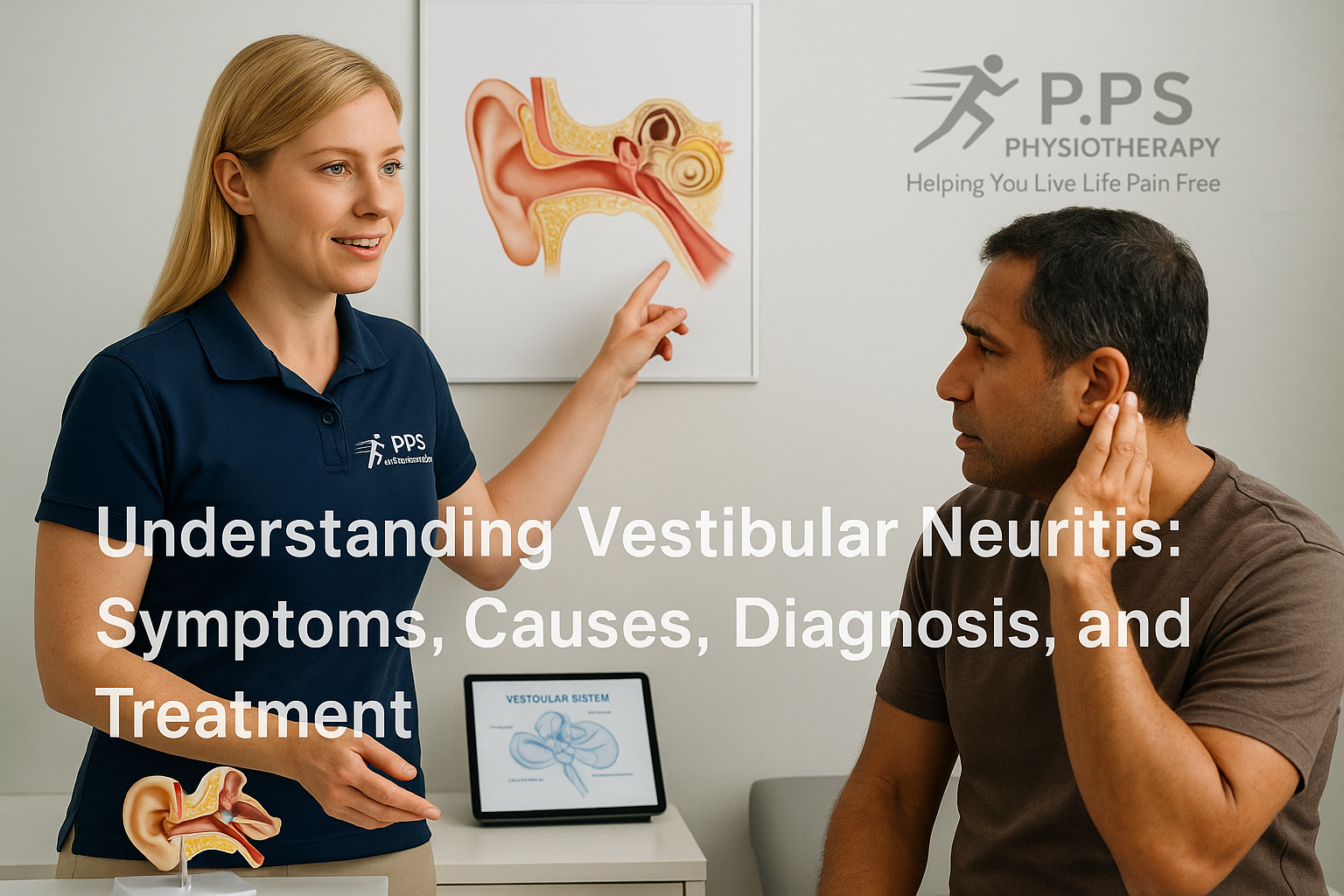Introduction
Vestibular neuritis is an inner ear condition that can cause severe dizziness and balance issues. It occurs when the vestibular nerve becomes inflamed, disrupting balance signals. While the symptoms can be disabling, early intervention can help you recover and regain control over your balance.
In this post, we’ll explore everything you need to know about this vestibular disorder, from its causes to effective treatments like vestibular rehabilitation therapy.
What is Vestibular Neuritis?

Vestibular neuritis is the inflammation of the vestibular nerve, a key component of the inner ear responsible for sending balance information to the brain. The condition primarily affects balance without causing hearing loss.
- Symptoms: Sudden vertigo, nausea, and balance problems.
- Causes: Mostly viral infections, but other factors like trauma or autoimmune conditions may contribute.
Unlike other vestibular disorders, this inner ear disorder usually does not impact hearing.
Symptoms of Vestibular Neuritis
The main symptoms of this vestibular disorder include:
- Severe Vertigo: A sudden spinning sensation.
- Balance Problems: Difficulty walking or coordinating movements.
- Nausea and Vomiting: Often triggered by dizziness.
- Dizziness: Feeling lightheaded even without movement.
These symptoms can appear suddenly and can last anywhere from several hours to several weeks.
Causes of Vestibular Neuritis
The most common cause of this vestibular disorder is a viral infection. Several viruses can trigger this condition, including:
- Herpes simplex virus (HSV)
- Varicella-zoster virus (shingles/chickenpox)
In rare cases, this inner ear inflammation can also result from autoimmune diseases or head trauma. For further reading, refer to this study on vestibular neuritis from NCBI.
Diagnosis
Diagnosing this vestibular disorder involves:
- Medical History Review: Health professionals will ask about your symptoms and recent viral infections.
- Physical Examination: Tests such as the head impulse test help assess balance.
- Hearing Tests: Hearing loss can help rule out other conditions like labyrinthitis.
- Imaging: An MRI may be performed to rule out other causes, though vestibular neuritis can often be diagnosed clinically.
Treatment for Vestibular Neuritis
Effective treatment for this inner ear disorder includes medications, rehabilitation, and lifestyle adjustments.
1. Medications
- Vestibular suppressants: Meclizine or diazepam to reduce dizziness.
- Corticosteroids: Occasionally prescribed to reduce inflammation.
- Antiemetics: For nausea and vomiting associated with vertigo.
2. Vestibular Rehabilitation Therapy (VRT)

- Gaze Stabilization: Focus on a target while moving your head.
- Balance Training: Exercises that improve overall balance.
- Habituation Exercises: Help the brain adjust to movements that cause dizziness.
VRT can significantly speed up the recovery process by retraining the brain to compensate for disrupted balance signals.
3. Self-Care
- Rest: Take it easy during the acute phase to reduce symptoms.
- Hydration: Stay well-hydrated to help with recovery.
- Avoid Strenuous Activity: Steer clear of activities that may exacerbate dizziness.
4. Long-Term Outlook
Most individuals recover within a few weeks to several months. Vestibular rehabilitation is key to a quicker recovery.
Why You Should See a Physiotherapist for Vestibular Neuritis
If you’re suffering from vertigo or balance problems, seeing a physiotherapist is crucial. Physiotherapists with extensive experience in vestibular rehabilitation can:
- Diagnose the condition: Determine if vestibular neuritis is the cause of your symptoms.
- Provide personalised treatment: Design a rehabilitation plan tailored to your specific needs.
- Speed up recovery: Vestibular rehabilitation therapy helps retrain the brain and improve balance.
At PPS Physiotherapy, our experienced team provides excellent care for vestibular neuritis and other vestibular disorders. We’ll help you regain balance and get back to doing the things you love.
If you or a loved one is experiencing symptoms of vestibular neuritis, don’t wait to get help. Book an appointment with one of our experienced physiotherapists today to begin your recovery journey. Contact us now for more information or to schedule a consultation.

